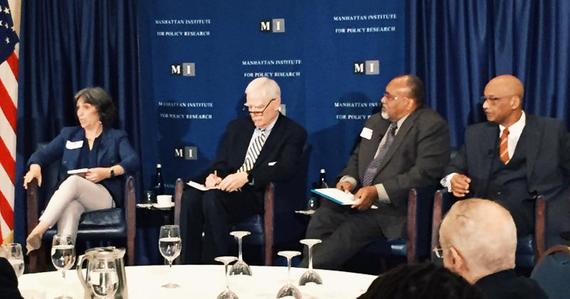Recently, the Manhattan Institute convened a day-long forum, "Prospects for Black America: The Moynihan Report Turns 50." In the aftermath of Ferguson, South Carolina, and most recently Baltimore, the first panel, "Reducing Crime Rates in the Black Community," was timely. Former Maryland Governor, Bob Ehrlich, kicked off the discussion by questioning the presence of fathers and the lack of realistic sentencing guidelines. He argued that Baltimore's problems are the result of failed policies. For Ehlrich, funneling more money into inner cities is not the answer. This view is supported by a recent report in the Washington Free Beacon, which analyzed $1.8 million in stimulus funds received by the City of Baltimore. Apparently, the city received $467.1 million to invest in education and $26.5 million for crime prevention. The question is, "Where did all of that money go?"
Heather MacDonald, with the Manhattan Institute, believes police officers must refine their tactics and guard against misperceiving threats. She argued that police officers should visit schools and create positive interactions with the communities they serve. She asked, "Where are the beat cops?"
John McWhorter, a linguist and professor at Columbia University, proposed the most controversial argument of the day - support for the decriminalization of narcotics. McWhorter made his case with the statistic that "90 percent of black crime is tied to drugs and violent crime." If drugs were legal, there would be no need for gangs and turf battles. He maintained that once drug sales took over the black community, violence increased; and "drug penalties became the main problem in the black community." The question still remains, however, whether young black men in urban areas will seek legitimate employment. Ehrlich added that the legalization of drugs result in trading a drug problem for "a public health one."
On the panel entitled "A Path Forward on Education Reform," Craig Frisby, an Associate Professor of Education at the University of Missouri, argued that the basic rule is all kids learn at different levels, especially black children. For those children who need more time, some successful techniques have emerged: schools should start earlier and end later; kids should attend school two Saturdays a month; and kids should attend school for part of the summer.
Kevin Chavous, with the American Federation of Children, says we should "take politics out of education" and develop a sense of urgency for children of color. For Chavous, Common Core is a long-term goal, but he said right now, "there's a short-term urgency."
Kaya Henderson, Chancellor of DC Public Schools, said the District focuses on improving teacher quality; providing higher quality curriculum; and the city's financial investment in the school system. The latter seems obvious as the District of Columbia spends the most per pupil nationwide. Some experts would argue, however, that given the amount spent, better results should be expected.
In the final panel, "Restoring the Family," Ron Haskins, of the Brookings Institution, offered statistics from the 2010 Census. "Marriage rates have declined for every age group and race except for college-educated women" said Haskins. Now, 72 percent of black kids are born out of wedlock. In the last four years, the percentage of married families with children has decreased from 78 to 51 percent. It is no surprise that children are five times as likely to be poor in single-headed households, added Haskins. These facts led Haskins to conclude that "Poverty is not winning for kids."
Economics professor Glenn Loury, of Brown University, claims that Daniel Moynihan's 50-year-old report was correct, "Family disintegration has enormous consequences for the entire society." Moreover, the state tools designed to help families, namely welfare, have failed to correct the larger problem.
Bob Woodson, President of the Center for Neighborhood Enterprise, declared "A one-year moratorium on whining about white folks," and said the anger expressed by blacks 50 years ago is what he sees today. Woodson's organization works in urban and poor areas across the country. Woodson argued, "Yes, the family has disintegrated, but we need to address the enemy within the black community and stop pimping poor people."
Woodson proposed that policymakers and academia study families who are success stories instead of focusing on the failures. He gave an example of a single mother with 5 children in a DC housing project who successfully organized other mothers to improve safety and living conditions. This mother sent all of her children to college. Woodson claims, "Everyone came to witness the success of this housing project except researchers and policymakers." Woodson said success stories are everywhere. Ex-offenders become role models and coaches in these communities. He asked that we find the social entrepreneurs in the inner cities.
Jason Riley and Johnny Taylor, of the Thurgood Marshall College Fund, which represents publicly-supported Historically Black Colleges and Universities (HBCU), closed the forum. Taylor argued that facts don't matter - the various narratives that resonate with the general public matter.
According to Taylor, one narrative is access to education. He stated that the average tuition at a HBCU public college is $7,000 a year, adding, "I don't buy into the notion that education is not accessible." Furthermore, education spending in Baltimore schools is the second highest in the country.
Taylor noted that the Ferguson narrative revolved around the racial make-up of the police department. The same narrative does not apply, however, in Baltimore, which has a significant black police presence. He closed by stating, "The solutions need to come from within the black community." The black leaders participating in this forum likely would agree.
To watch the forum, click here.
